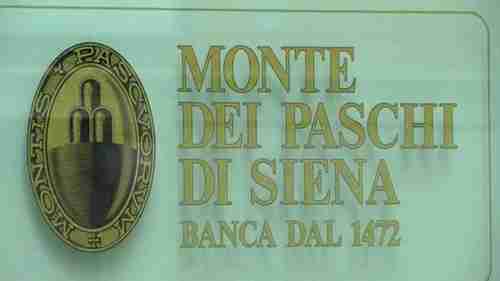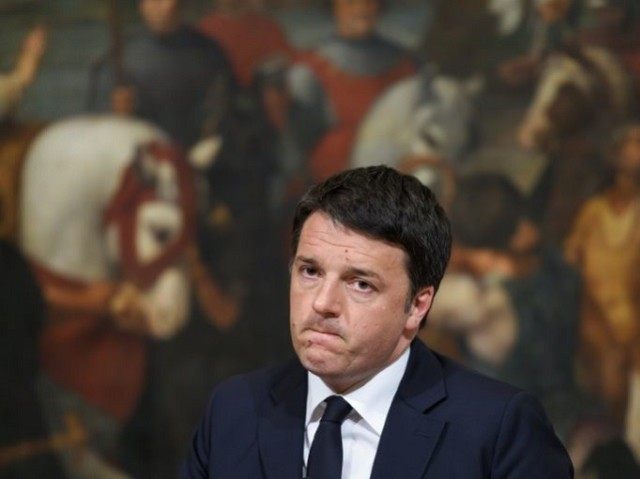This morning’s key headlines from GenerationalDynamics.com
- Italy bank crisis more dangerous to EU than Brexit
- EU Banking Union rules were a reaction to Greece’s financial crisis
Italy bank crisis more dangerous to EU than Brexit

The Banco Monte dei Paschi di Siena (MPS), established 1472, the world’s oldest operating bank, will face a crisis on July 29
Italy’s prime minister Matteo Renzi is considering “unilateral action” to bail out Italian banks with taxpayer money, in violation of EU rules. Action is needed because Italy’s already fragile banking system has a staggering $420 billion of bad loans on its books. Italy’s bank crisis and confrontation with the EU has gotten so deep that some analysts say it threatens the European Union “worse than Brexit.”
Italy’s largest bank is Banco Monte dei Paschi di Siena (MPS), founded in 1472, and the world’s oldest operating bank. Its share of bad loans comes to $55.2 billion. There may be a major crisis on July 29, when the ECB announces the results of the latest rounds of bank “stress tests.” It is believed that these stress tests will force major recapitalizations on MSP and other Italian banks.
MPS’s stock price has fallen 80% in the last year, and fell 14% on Monday, following reports that the European Central Bank is going to issue an “ultimatum” to reduce its bad loans portfolio to $32.2 billion by 2018.
How is MPS going to reduce its bad loans? MPS could call the loans in, forcing the borrowers to pay or declare bankruptcy, and MPS estimates that it would only recoup 39% of the face value of the loans. Or, MPS could sell the bad loans to a third party, in which case it would only get 20% of the face value. This would reduce the bad loan portfolio, but it would also require a bank bailout of MPS, and that’s where the confrontation is emerging.
The bailout issue became explosive last year, when Italy arranged for the bailout of four small regional banks (Banca delle Marche, Banca Popolare dell’Etruria e del Lazio, Cassa di Risparmio di Ferrara and Cassa di Risparmio della Provincia di Chieti) which received a $3.8 billion bailout, following strict EU Banking Union rules.
Under the terms of the bailout, ordinary savings deposits were spared, but people who had purchased bonds and shares issued by the bank would be wiped out. Some 130,000 shareholders and junior bond holders lost money in the rescue.
A 68-year-old pensioner, Luigino D’Angelo, hanged himself, after learning that his $120,000 savings were wiped out by the bank bailout. The problem is that he did not have an ordinary savings account. Instead, he had put his money into the bank’s high-risk subordinated bonds, probably because some over-eager bank salesman told him that they were high-return, and perfectly safe. He left a suicide note for his wife of 51 years, saying that he felt humiliated and swindled by his bank, the Banca Etruria.
Because of this highly publicized suicide, which many in the public blame on strict application of EU Banking Union rules, Italy’s prime minister Matteo Renzi is considering “unilateral action” to bail out Italian banks with taxpayer money. In this case, the bailout would be paid for by the taxpayer, rather than by bond and share holders. Retail investors hold roughly a third of total outstanding Italian bank debt, and forcing them to lose their savings could disrupt financial stability and undermine depositors’ confidence, and even threaten bank runs.
This pending crisis comes in the midst of plans for Italy to hold a a constitutional referendum on political reform in October. Renzi has said that he will step down if the referendum vote fails. This has added to Italy’s political instability, and Citibank has described the vote as, “probably the single biggest risk on the European political landscape this year outside the UK [Brexit].” Deutsche Welle and Fitch Ratings and International Business Times (10-Dec-2015)
EU Banking Union rules were a reaction to Greece’s financial crisis
The plan by Italy’s prime minister Matteo Renzi to bail out Italy’s banks with taxpayer money is a violation of EU Banking Union rules that were adopted as “lessons learned” from the financial crisis and, particularly, Greece’s financial crisis.
The Banking Union makes the European Central Bank (ECB) the supervisor of all 6000 banks in the eurozone, applying a single rule book that applies to all of them. Other EU countries that still use national currencies have the option of joining.
The purpose of the union is to prevent the following “vicious circle”:
- A country’s banking system is in trouble because of a large number of bad loans.
- The national government bails the banks out with taxpayer money, either by buying the bad debt (transferring it into a national “bad bank”), or else recapitalizing the banks by purchasing bank bonds or share.
- This essentially transfers the banks’ bad debts to the national government, putting the government into greater debt.
- Investors are afraid to purchase government bonds, so their values go down and their yields (interest rates) go up. In Greece’s crisis, in December 2011, yields on Greece’s two-year bonds actually reached 142.3%.
- As bond yields rise, the banking system is in even worse trouble, requiring a larger government bailout, and so the cycle repeats.
The EU’s banking union provides three levels of rules:
- Crisis Prevention: Under ECB supervision, banks are far less likely to get into trouble in the first place. This will be accomplished in various ways, in particular by requiring banks to pass “stress tests” on a regular basis, such as the ones for MSP and other Italian banks that will be announced on July 29.
- Early Intervention. If an institution’s situation begins to deteriorate (e.g. when a bank is in breach of, or is about to breach, regulatory capital requirements), the ECB can force the bank to adopt urgent reforms, because the crisis worsens.
- Crisis Management. If the financial situation of a bank deteriorates beyond repair, the ECB can provide a partial bailout from a fund to which all EU banks contribute.
In the last case, a “bail-in” process would be used to determine who is going to lose their money to save the bank. If a bank needs to resort to bail-in, authorities would first write down all shareholders and would then follow a pre-determined order in bailing in other liabilities. Shareholders and other holders of instruments such as convertible bonds and junior bonds would bear losses first.
Deposits under 100,000 euros would be protected, and taxpayer money would never be used.
Italy’s government followed these rules last year, but 130,000 people had their savings wiped out, and the suicide of the 68 year old pensioner whose savings were wiped out has become politically explosive. These people did not have ordinary savings accounts. Instead, they were talked into investing in high-risk high-return bank bonds, and they ended up being wiped out.
The European Union put these banking union rules into place in 2015, and already they’re facing a major confrontation, which may turn into a major crisis on July 29, when the ECB’s stress tests of Italy’s banks will be published. If Italy follows the rules, hundreds of thousands of additional people will lose their life savings. That’s why prime minister Matteo Renzi has issued his ultimatum that he will violate EU rules and bail out the banks with taxpayer money. However, this will only “kick the can down the road,” in a familiar process where one crisis is solved, but a new one emerges a few months later. Newstalk (Ireland) and Reuters and European Union Banking Union
KEYS: Generational Dynamics, Italy, Matteo Renzi, Banco Monte dei Paschi di Siena, MPS, Luigino D’Angelo, European Central Bank, ECB
Permanent web link to this article
Receive daily World View columns by e-mail

COMMENTS
Please let us know if you're having issues with commenting.